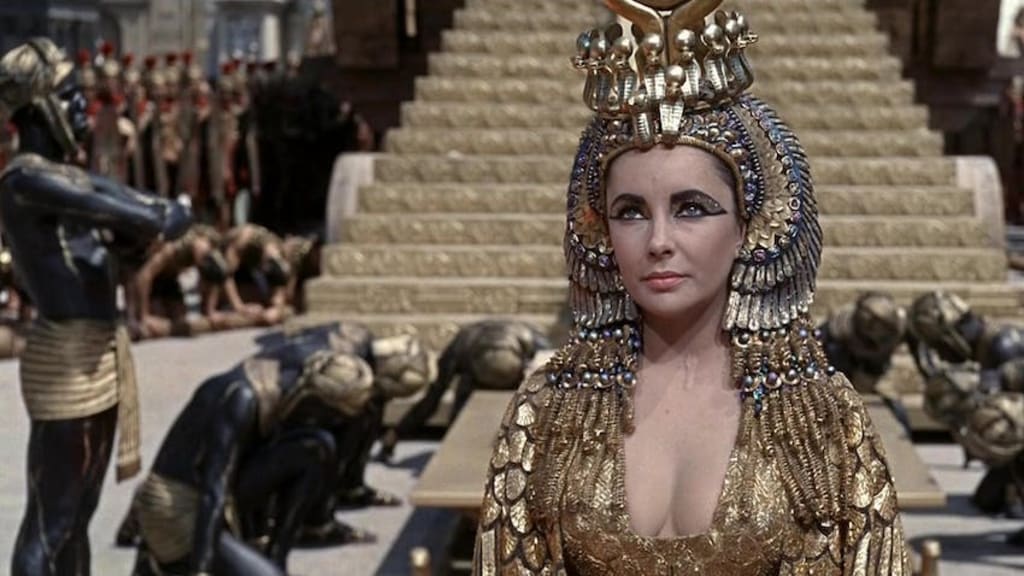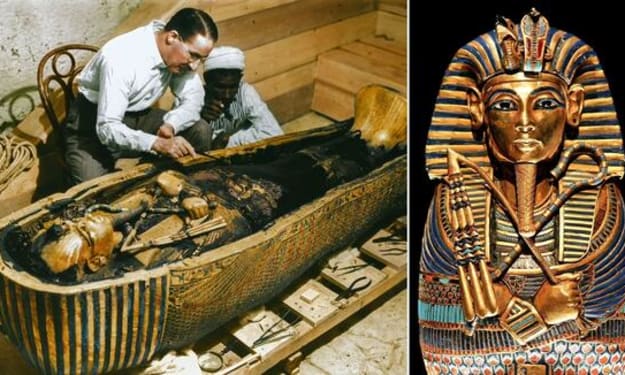Cleopatra's Education and Intelligence
Cleopatra's birth and significance

I. Introduction
- Cleopatra's birth and significance
- Her reputation in history
II. Cleopatra's Education and Intelligence
- Cleopatra's education in the palace
- Her mastery of multiple languages
- Cleopatra's knowledge of philosophy and oratory
III. Cleopatra's Political and Strategic Abilities
- Cleopatra as a strategist and tactician
- Her alliances with Julius Caesar and Mark Antony
- Political maneuvering and diplomacy
IV. Cleopatra's Cultural Influence
- Alexandria as a cultural center
- The famous Library of Alexandria
- Cleopatra's patronage of arts and literature
V. Cleopatra's Physical Appearance
- Controversies and misconceptions
- Descriptions from historical sources
- Depictions on coins and sculptures
VI. Cleopatra's Rise to Power and Dynastic Background
- The Ptolemaic dynasty
- Cleopatra's ancestors and family history
- Cleopatra VII's ascension to the throne
VII. Cleopatra's Relationship with Julius Caesar
- Cleopatra's exile and return to Alexandria
- Meeting with Julius Caesar
- Their romantic relationship and its implications
VIII. Cleopatra's Rule and Prosperity in Egypt
- Cleopatra's accomplishments as a ruler
- Economic and cultural advancements
- Consolidation of power and stability in Egypt
IX. Cleopatra's Downfall and Death
- The alliance with Mark Antony
- The Battle of Actium and defeat
- Cleopatra's suicide and legacy
X. Conclusion
- Cleopatra's enduring legacy and historical importance
Cleopatra: The Enigmatic Queen of Egypt
Cleopatra, the renowned queen of ancient Egypt, was born in 69 BC in the city of Alexandria, which was founded by Alexander the Great and situated in the Nile Delta. Cleopatra's name is synonymous with power, intelligence, and allure, making her one of the most well-known women in the history of mankind. Throughout her remarkable life, Cleopatra showcased her strategic prowess, determination, immense intellect, and vast wealth.
Greek philosopher Plutarch described the mesmerizing effect Cleopatra had on people, stating that her presence was irresistible. From her time to the present day, Cleopatra continues to captivate and enchant many. Her life trajectory has been extensively studied, researched, and debated in an effort to understand her greatness.
There are intriguing facts that shed light on Cleopatra's extraordinary life. For instance, a golden statue of Cleopatra was erected in a temple dedicated to the goddess Venus at the request of Julius Caesar, her lover and a prominent Roman leader. This monument was venerated at the site for several centuries and symbolized her divine status. Cleopatra was even worshipped as a goddess herself, particularly as a new incarnation of the revered Egyptian deity, Isis. Additionally, she was associated with Aphrodite, the Greek goddess whose attributes mirrored those of Isis.
Cleopatra possessed refined intelligence and received an exceptional education, alongside other royal children, within the palace where she resided. Fluent in seven or eight languages, including Egyptian, Cleopatra had a linguistic advantage that facilitated her negotiations and political strategies. She was the first in her family to speak Egyptian fluently without the need for interpreters. Cleopatra's thirst for knowledge extended beyond languages, encompassing philosophy and rhetoric. Her oratory skills were impeccable, employing correct posture, appropriate gestures, and a soft, engaging voice.
The cultural environment in Alexandria, renowned for its famous library, played.
Cleopatra's intelligence was not limited to her linguistic abilities and education. She also possessed remarkable political and strategic acumen. Cleopatra was known for her astute decision-making and her ability to navigate the complex political landscape of the time. She strategically aligned herself with powerful figures such as Julius Caesar and Mark Antony, forging alliances that helped secure her position as the ruler of Egypt.
Cleopatra's relationship with Julius Caesar was a turning point in her life. After being exiled from Egypt, she seized the opportunity to meet with Caesar in Rome and convinced him to support her claim to the throne. Their romantic relationship further solidified their alliance, and Cleopatra returned to Egypt with Caesar's backing, effectively reclaiming her position as the queen.
As a ruler, Cleopatra brought prosperity and stability to Egypt. She implemented various economic reforms that improved trade and agriculture, contributing to the wealth of the kingdom. Cleopatra's patronage of the arts and literature also played a significant role in the cultural advancement of Alexandria. The city became a vibrant center of intellectual and artistic pursuits, attracting scholars, philosophers, and artists from all over the world.
However, Cleopatra's fortunes took a dramatic turn with the rise of Octavian (later known as Emperor Augustus) and his conflict with Mark Antony. Cleopatra formed an alliance with Mark Antony and became his partner both politically and romantically. They fought against Octavian in the famous Battle of Actium but were ultimately defeated. Facing capture and humiliation, Cleopatra chose to take her own life. According to historical accounts, she died from the bite of an asp, a venomous snake.
Cleopatra's death marked the end of the Ptolemaic dynasty and the beginning of Roman rule in Egypt. Despite her defeat, Cleopatra's legacy endured. She became an enduring symbol of female power, intelligence, and allure. Her story has been immortalized in literature, art, and film, with countless interpretations and portrayals capturing the fascination that surrounds her.
In conclusion, Cleopatra's life and reign as the queen of Egypt continue to captivate the world. Her intelligence, political acumen, cultural influence, and personal charisma made her an iconic figure in history. Cleopatra's legacy as a powerful and enigmatic queen endures, leaving an indelible mark on the ancient world and beyond.
Furthermore, Cleopatra's impact extended beyond her political achievements. She was known for her strong advocacy of Egyptian culture and traditions. Cleopatra presented herself as the embodiment of the ancient Egyptian pharaohs, portraying herself in art and literature as the reincarnation of the goddess Isis. By aligning herself with Egypt's rich heritage, she sought to solidify her legitimacy and win the support of her subjects.
Cleopatra's relationship with the Roman leaders also had far-reaching consequences. Her connections to Julius Caesar and Mark Antony not only shaped her personal fate but also influenced the political landscape of the Roman Empire. Following her death, Egypt became a Roman province, ending centuries of independent rule. This marked a significant shift in the balance of power in the ancient world and further cemented Rome's dominance.
While Cleopatra's reign may have ended in tragedy, her impact on history cannot be understated. Her intelligence, charisma, and political prowess continue to inspire and captivate people around the globe. Cleopatra's story serves as a reminder of the complexities of power, the interplay of cultures, and the indomitable spirit of a woman who defied societal norms to lead her nation.
Today, Cleopatra remains an enduring symbol of female empowerment and leadership. Her legend has inspired countless works of literature, art, and film, making her one of the most iconic and recognizable figures from antiquity. Scholars and historians continue to study and analyze her life, attempting to unravel the mysteries and separate the facts from the embellishments of her story.
In conclusion, Cleopatra's intelligence, political acumen, and cultural influence have secured her a place in history as one of the most remarkable and fascinating figures of antiquity. Her legacy as the last active pharaoh of Egypt and her enduring image as a powerful, intelligent, and enigmatic queen continue to captivate the imagination of people worldwide. Cleopatra's story serves as a testament to the indelible impact one individual can have on the course of history.
Despite the passage of centuries, Cleopatra's story continues to evoke intrigue and fascination. The mystique surrounding her life, relationships, and downfall has fueled numerous theories, speculations, and myths. Some accounts depict her as a seductress who used her beauty to manipulate powerful men, while others highlight her intellectual prowess and diplomatic skills.
It is essential to recognize the historical context in which Cleopatra lived. The political landscape of the time was tumultuous, with power struggles, alliances, and shifting loyalties. Cleopatra navigated these treacherous waters with a shrewdness that allowed her to maintain her authority and protect her kingdom's interests.
Beyond her political achievements, Cleopatra was also known for her patronage of the arts and sciences. She fostered a cultural renaissance in Egypt, supporting poets, scholars, and philosophers. Alexandria, the capital of Egypt under her reign, became a vibrant center of intellectual and artistic innovation. Cleopatra's influence extended beyond politics and into the realm of culture, leaving an indelible mark on the artistic and intellectual legacy of Egypt.
In recent years, there has been a renewed interest in uncovering the truth about Cleopatra's life. Archaeological excavations, historical research, and advancements in technology have shed new light on the era in which she lived. Scholars are continually piecing together fragments of information to gain a deeper understanding of Cleopatra's reign, her interactions with the Roman Empire, and her role in shaping the destiny of Egypt.
Moreover, Cleopatra's story serves as a reminder of the complexity and diversity of the ancient world. Her reign occurred during a time of rich cultural exchange, with Egypt acting as a bridge between the Eastern and Western civilizations. Cleopatra herself was of Greek and Egyptian heritage, embodying the fusion of these cultures. Her reign reflects the interconnectedness and intermingling of different societies, highlighting the diverse tapestry of human history.
In conclusion, Cleopatra's legacy endures as a testament to her remarkable intelligence, political astuteness, and cultural contributions. Her story continues to captivate our imagination, challenging us to reevaluate preconceived notions and delve into the complexities of history. Cleopatra's influence reverberates through time, reminding us of the indomitable spirit of a woman who defied convention and left an indelible mark on the ancient world.





Comments
There are no comments for this story
Be the first to respond and start the conversation.